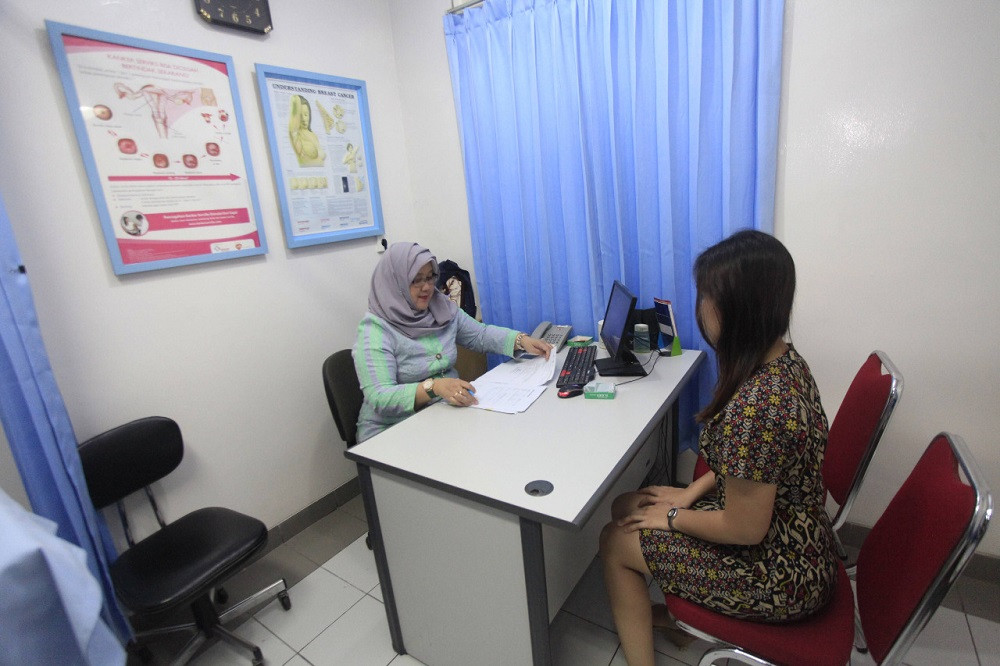Popular Reads
Top Results
Can't find what you're looking for?
View all search resultsPopular Reads
Top Results
Can't find what you're looking for?
View all search resultsIndonesia still suffering from access gaps, delayed diagnosis in fight against cancer: Report
Delayed diagnosis and gaps in service to cancer patients serve to underline the state of Indonesia's healthcare, which ranks below the Asia-Pacific average, according to the Economist Intelligence Unit's Index of Cancer Preparedness.
Change text size
Gift Premium Articles
to Anyone
F
or 32-year-old Wiji Cahyono, the back pains that have cost him so many nights of sleep are now becoming so unbearable that he felt “like dying”, if it were not for the support of his friends and fellow cancer fighters online.
In February, a hospital in his hometown of Madiun, East Java, diagnosed him with colon cancer, after an earlier diagnosis of grade 3 hemorrhoids at another hospital in late 2019.
A month later, the company he had been working for in Yogyakarta for the past three years decided to lay him off, as COVID-19 began to sweep across Indonesia.
Things got gradually worse when hospitals in the city began announcing that they were no longer able to provide further treatment for his cancer. Wiji said he was referred to a much larger hospital in East Java’s capital Surabaya, about a four-hour drive away from Madiun.
"I went there once and was supposed to go there again for a further diagnostic check-up, even though I have a file from the previous hospital. But then Surabaya turned into a COVID-19 black zone, so my family and I decided not to go,” he told The Jakarta Post on Thursday.
"I'd rather die of cancer than of COVID-19."
Read also: As COVID-19 transmission rate soars, Surabaya urged to restore restrictions
But then his condition soon deteriorated and so was referred to another hospital in Surakarta, Central Java, about two hours away by car. Wiji had to redo his diagnostics there, which meant that he would have to go back and forth to the city in the near future.
Wiji did not appear as concerned about being exposed to COVID-19 as he was about the transportation costs that must be borne, as well as any out-of-pocket spending on drugs and treatments that might not be covered by the National Health Insurance (JKN).
"I'm relying on donations from my friends now. I've pawned my house certificate and in the worst case, I might have to sell my house too,” he said. “The JKN has been of very great help, though.”
Wiji's experience offers a glimpse into the extent of cancer preparedness in Indonesia, which has seen its cancer prevalence increase from 1.4 cases in 2013 to 1.79 per 1,000 people in the population.
Indonesia should focus on "closing access gaps and ensuring quality of services across the cancer continuum through better infrastructure and service supply,” Economist Intelligence Unit (EIU) researchers suggested following the launch of its latest report, “Cancer preparedness in the Asia-Pacific: Progress toward universal cancer control”.
The report explored findings from the EIU's Index of Cancer Preparedness (ICP), which measures the readiness of healthcare systems by exploring three broad domains: policy and planning, care delivery and health systems and governance.
It revealed that Indonesia ranked 7th among nine countries in the region – Australia, China, India, Japan, Malaysia, the Philippines, South Korea, Thailand and Vietnam – with an overall score of 57.4 out of 100, below the regional average of 66.5.
Read also: What should our healthcare reform focus on after COVID-19?
The report noted that in the lower middle-income group, which until recently included Indonesia, there were gaps in the availability of services, particularly the underprovision of care in rural or remote areas.
"In middle-income countries, the primary concerns are management of rising cancer costs, inadequate quality and capacity, fragmentation in care and centralization of services in main urban centers," the report said.
It also highlighted the country's lack of specialists, citing various data showing that Indonesia's density of radiology and clinical oncologists was way below 0.02 per 1,000 population, although there is no standard that constitutes an appropriate level of staffing.
Indonesia, alongside Vietnam and the Philippines, also came in last in the EIU's indicator on the capacity of radiotherapy machines to meet patient demands.
World Health Organization data from 2014 cited in the report showed that in all but two countries – Indonesia and China – radiotherapy is available in the public health system. In 2013, said the report, there were an estimated 37.8 machines available in Indonesia, or about 0.15 machines per million population for the country’s then-250 million people.
Delayed diagnosis was also a “key challenge in the region, according to the report, which researchers say could contribute to poor survival prospects. Last year, the National Cancer Prevention Committee said 65 percent of cancer patients in Indonesia only sought treatment in the disease’s late stages.
"[While] making sure that several screenings are in place for breast cancer, and colorectal cancer screening is available in the public health system, [it is more important that] it’s accessible to the wider population who need it – these are key to start overcoming late diagnoses,” said EIU managing editor Jesse Quigley Jones during a virtual media briefing on Wednesday.
The report notes that while Indonesia has existing national programs for human papillomavirus (HPV) vaccination and cervical and breast cancer screening, the country was still lacking in clinical breast exams, fecal occult blood tests to screen for colorectal cancer, and colonoscopy to screen for bowel cancer, citing WHO data.
Breast, cervix uteri and colorectal cancer comprised the majority of new cases in Indonesia in 2018, according to Globocan data, alongside lung and liver cancer.
The JKN, while it has brought about positive outcomes and promised coverage for treatments such as chemotherapy and radiotherapy, still has limited screening and early detection programs for cervical, breast and prostate cancer, and has been known to delist several treatment drugs, the report said.










